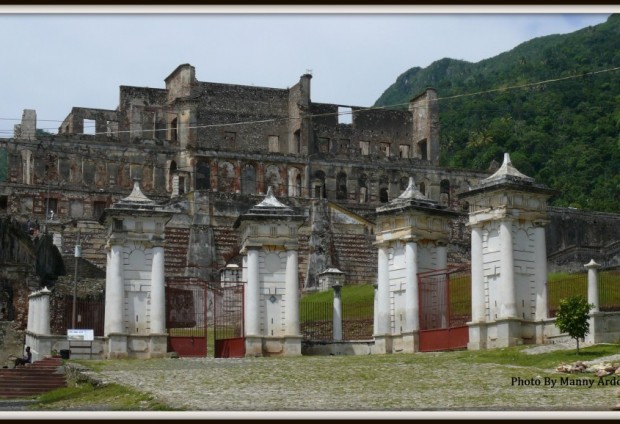Can an Elected President Alone Save Haiti?
By Max Zamor
November 2010
maxzamor@comcast.net
It doesn’t take a genius to know what is needed now in Haiti: A capable manager who is honest, with iron like character. Many Haitians will tell you there is no such candidate in the field who is vying for their vote this Sunday. Hence, the less than tepid attitude among those who will be most affected by these elections. Where does that leave the country?
Among the rubbles strewn streets of Port-au-Prince and other cities, you’ll still find, not only some dried up body parts of those who died in the January 12th 2010 earthquake, but also Haiti’s hope, gasping for air. In a country that has traditionally gone through so much heartbreak, the elections of 2010 offer one more episode that can either bring that lifeline or deepen the desperation of the Haitian people.
Of course, all the candidates will tell you that they possess the qualities needed to lift the country out of its misery. But few Haitians put much stock in their promises. Besides, the enormity of the problems goes beyond broken down buildings, a nonfunctioning Government or ravaging cholera. In Haiti, all basic needs are priorities. Among those, most prominent is honesty of elected officials and their ability to broker togetherness in an underlying river of mistrust between the rich and the poor. In a country where every credible report says that there are only five families who control its wealth, it is not hard to understand why this togetherness is so elusive.
It is also understood why, the almost four millions Haitians who live abroad, most are well educated, qualified and experienced professionals, have been kept away from participating in the country’s politics. There is hope that will change with the next Government. But will it? That depends on who you ask and the sincerity of the next President.
The current Constitution has been a wedge of contention between Haitians in the country and those who live abroad: The latters have been barred from participating in Haiti’s political life. Haitian politicians have long fought hard to keep them away while having no problem to court their money. The Haitian Diaspora have also long vie for a change of this clause in the Constitution, if nothing else, because of the enormous contribution they make to Haiti’s GDP. They send close a billion dollars each year to relatives living in the country. Since any amendment to the Constitution cannot take effect during the presidency it is adopted under, even if such change is made during the next elected Government, it will not take effect before five years, when the next government is in power. By that time, too many important decisions will have been made without the necessary and valuable input of the Haitian Diaspora.
In view of the dire conditions in Haiti, that will be too much wasted time. The situation dictates that any reconstruction of Haiti must have a significant participation of qualified Haitians from the start. Waiting five years or longer for that to happen can see many changes to the current dynamics; some may be bad or worse. The hope is that there will still be time for the Haitian Diaspora to have a shot at finally participating in their country’s development. But also, considering the electoral machinations conducted by René Préval deep in the bowels of the Palace since before January 12th 2010 to keep his party, if not his family in power, at least for Haïtians living abroad, this presidential election has much significance. It’s counter intuitive for anyone in power to voluntarily hand over the management of the country to another group, especially in a pseudo-dictatorial system. When it comes to the current Government, since the accumulation of wealth seems to be their primary goal, it would be foolish not to consider why there will be much resistance to such amendment. There was a time when the Haitian Diaspora believed that René Préval was honest is his willingness to include them in the affairs of the country. But he has reneged on every promise made to the Haitian people, why not this one.
Too often, Haitian politicians adopt creative slogans to raise the fervor of the masses into frenzy, promising changes that never come. We’ve seen it during the political landscape preceding former President Jean Bertrand Aristide’s election. “Men anpil, chay pa lou” still remains an iconic phrase in Haiti’s lexicon. Though he has never been pinned down with a specific catchy phrase because he says so little, President René Préval is known for his aloofness when dealing with the country’s urgencies. It is believed his behavior is a sign of incompetence or a clever way to mask devious schemes that further rob the country and its people. It is rare in the history of mankind to witness such ineffective leadership. It was almost laughable when, in the dark hours of earthquake’s aftermath, the Haitian people who needed to know there was someone in power who would take charge and reassure them that everything will be fine, saw President Préval complaining to the world, in front of CNN cameras, that he lost “his” Palace. That gave a glimpse inside a Haitian leader’s thinking that once in power, the country’s wealth and the people’s heritage are his personal property. There is not a tradition in Haiti to say that everything the Government owns belongs to the people. These leaders are not schooled to understand that they are elected to power to do the “People’s” job. Perhaps someone should have told René Préval that the Presidential Palace is not “his”, it belongs to the Haitian People. He didn’t lose a Palace, the country did. It is only his responsibility to maintain it during his tenure. If such a visible symbol of the people can be so boldly claimed, what about others that are hidden, potentially more destructive to the country when gone, like its coffers? They’ve been gnawed at with the same mental kleptomania by Haitian politicians for generations; hence not much is left anymore.
So, where do we go from here? Whoever is elected must quickly show a capacity to deliver on the people’s expectations and on their promises. The country is at a crossroad where any suspicion of malfeasance can trigger an eruption of civil unrest. There is growing anger at MINUSTAH, which is believed to have brought the cholera outbreak to the country. All indications point toward that fact. Therefore, the next President must balance the need for security with intolerance for law violators. Haitians believe that the occupying forces get away with anything committed in the country: Rape of young girls, transmitting HIV Aids, beatings, murder and now, the spread of cholera. This has the makings of genocide with the blessings of those in power. Those violators must not be limited to Haitians only, but all of those who are found guilty of committing a crime on Haitian soil. That’s one way to reclaim the country’s sovereignty. The Government seems to be either inept at making the tough decisions to correct the problem or afraid of losing the stipends that come with tolerating those behaviors; such stipends can trickle down to those who help support and sustain their agenda. And that can be in the millions.
A prominent politician running for the Haitian Senate declared it would take about half a million US dollars for a candidate to properly run a successful Senate campaign in Haiti. It begs the questions: How much does it take for a candidate to run a successful Presidential campaign in Haiti? And in view of all the money that is being spent now by those candidates to allegedly buy votes and spread terror, and the economic state of the country, where does all that money come from? Has political power in Haiti become an investment that must be recouped once elected? And how? Who will enjoy the dividends? And the suspicions continue.
Can an elected President alone save Haiti? Let’s hope that among the flock of candidates, there is one. And let’s also hope that Haitians can choose that one who is smart, savvy and thrifty enough to run a successful campaign without raping or mortgaging the lot of the people and its future.




No comments yet.